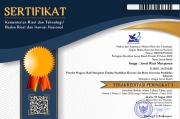Efek Faktor Moderasi Gender pada Relasi Financial Literacy dan Financial Ignorance terhadap Perilaku Keuangan
Abstract
Keywords
Full Text:
PDFReferences
Anderson, A., Baker, F., & Robinson, D. T. (2017). Precautionary savings, retirement planning and misperceptions of financial literacy. Journal of financial economics, 126(2), 383-398.
Barber, B. M., & Odean, T. (2001). Boys will be boys: Gender, overconfidence, and common stock investment. The quarterly journal of economics, 116(1), 261-292.
Barrafrem, K., Västfjäll, D., & Tinghög, G. (2020). Financial Homo Ignorans: measuring vulnerability to behavioral biases in household finance.
Brüggen, E. C., Hogreve, J., Holmlund, M., Kabadayi, S., & Löfgren, M. (2017). Financial well-being: A conceptualization and research agenda. Journal of Business Research, 79, 228-237.
Clark, R. L., & d’Ambrosio, M. B. (2003). Ignorance is not bliss: The importance of financial education. TIAA-CREF Research Dialogue, 78(1).
Dew, J., & Xiao, J. J. (2013). Financial declines, financial behaviors, and relationship happiness during the 2007–2009 recession. Journal of Financial Therapy, 4(1).
Dunn, L. F., & Mirzaie, I. A. (2012). Determinants of consumer debt stress: differences by debt type and gender. Department of Economics: Colombus, Ohio State University.
Hogarth, J. M., & Hilgert, M. A. (2002). Financial knowledge, experience and learning preferences: Preliminary results from a new survey on financial literacy. Consumer Interest Annual, 48(1), 1-7.
Hubler, D. S., Burr, B. K., Gardner, B. C., Larzelere, R. E., & Busby, D. M. (2016). The intergenerational transmission of financial stress and relationship outcomes. Marriage & Family Review, 52(4), 373-391.
Joo, S. H., & Grable, J. E. (2004). An exploratory framework of the determinants of financial satisfaction. Journal of family and economic Issues, 25(1), 25-50.
Kramer, M. M. (2016). Financial literacy, confidence and financial advice seeking. Journal of Economic Behavior & Organization, 131, 198-217.
Leach, L. J., Hayhoe, C. R., & Turner, P. R. (1999). Factors affecting perceived economic well-being of college students: A gender perspective. Journal of Financial Counseling and Planning, 10(2), 11.
Lusardi, A., & Mitchelli, O. S. (2007). Financial literacy and retirement preparedness: Evidence and implications for financial education. Business economics, 42(1), 35-44.
Lyons, A. A., Rachlis, M., & Scherpf, E. (2007). What's in a score? Differences in consumers' credit knowledge using OLS and quantile regressions. The Journal of Consumer Affairs, 41(2), 223–249.
Peng, T. -C. M., Bartholomae, S., Fox, J. J., & Cravener, G. (2007). The impact of personal finance education delivered in high school and college courses. Journal of Family and Economic Issues, 28(2), 265–284.
Perry, V. G. (2008). Is ignorance bliss? Consumer accuracy in judgments about credit ratings. Journal of Consumer Affairs, 42(2), 189-205.
Shim, S., Xiao, J. J., Barber, B. L., & Lyons, A. C. (2009). Pathways to life success: A conceptual model of financial well-being for young adults. Journal of Applied Developmental Psychology, 30(6), 708-723.
Warmath, D., & Zimmerman, D. (2019). Financial Literacy as More than Knowledge: The Development of a Formative Scale through the Lens of Bloom's Domains of Knowledge. Journal of Consumer Affairs, 53(4), 1602-1629.
Xiao, J. J., Ahn, S. Y., Serido, J., & Shim, S. (2014). Earlier financial literacy and later financial behaviour of college students. International Journal of Consumer Studies, 38(6), 593-601
DOI: https://doi.org/10.17509/image.2023.015
Refbacks
- There are currently no refbacks.
Copyright (c) 2023 Maya Sari, Netti Siska Nurhayati, Tia Yuliawati
License URL: https://creativecommons.org/licenses/by-sa/4.0/
Image : Jurnal Riset Manajemen is licensed under a Creative Commons Attribution-ShareAlike 4.0 International License
View My Stats



